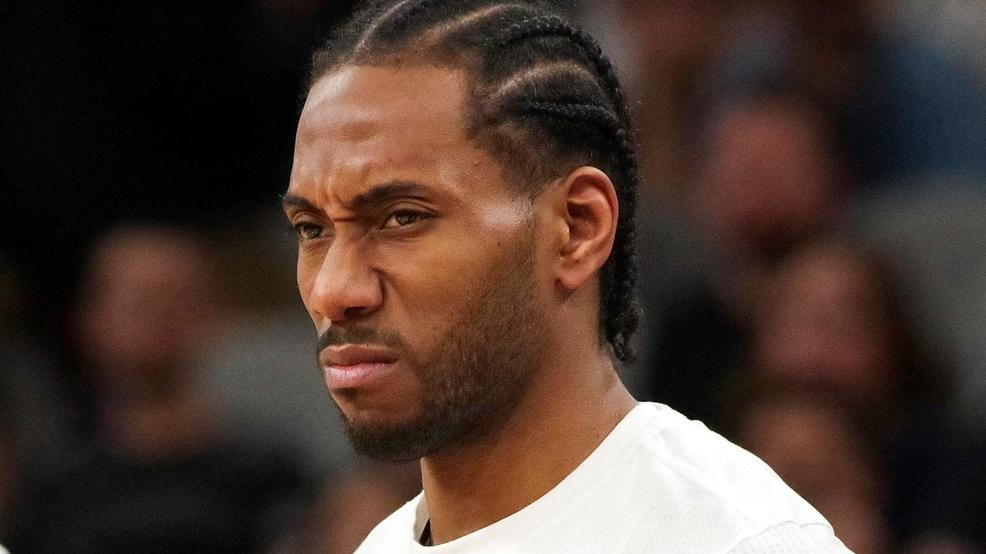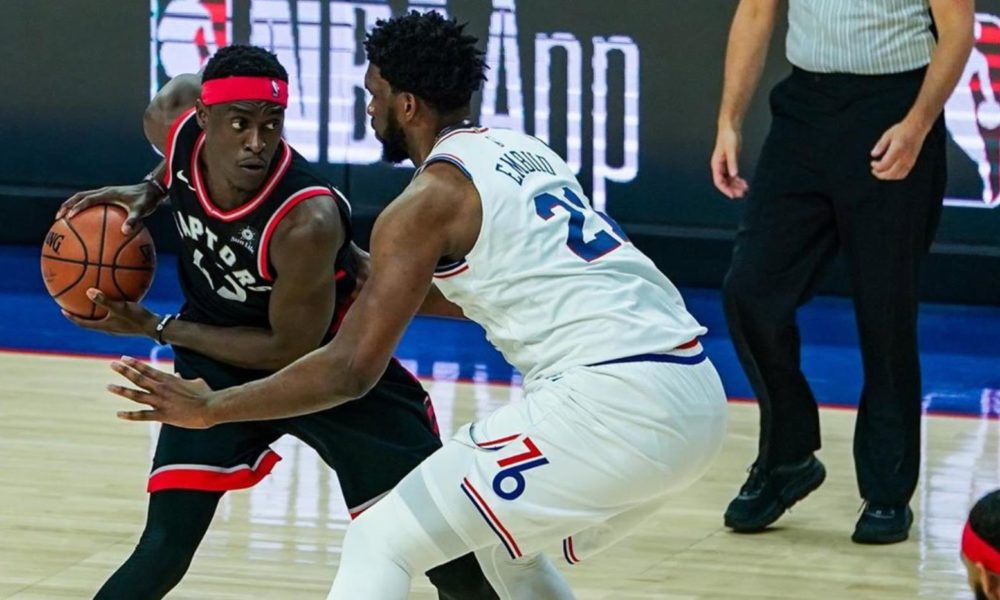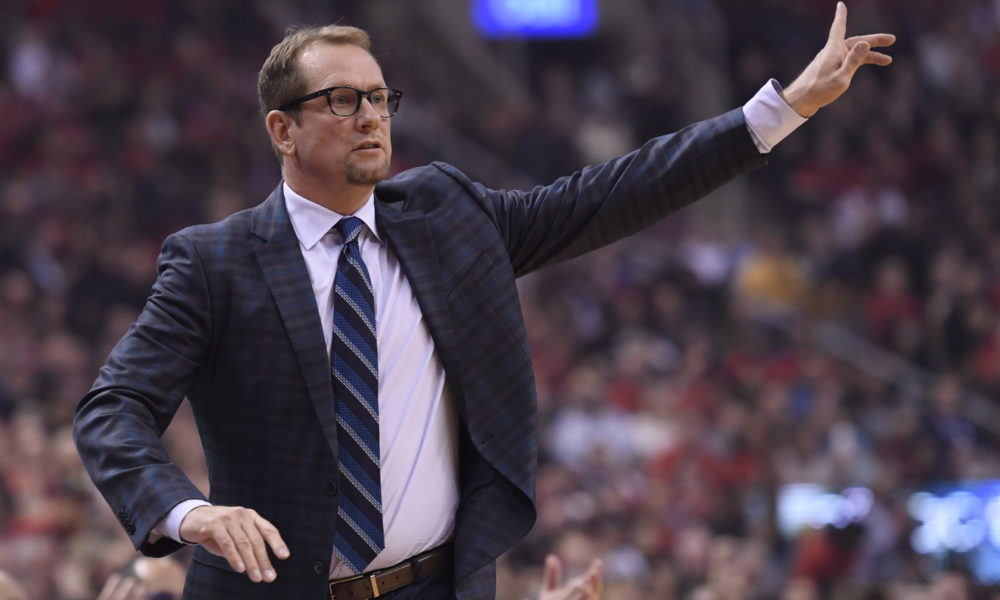There’s a famous experiment supposed to have taken place in 1996 that saw five chimpanzees placed in a room with several bananas on top of a ladder. If a chimpanzee climbed the ladder in search of the reward, scientists would soak all the primates with cold water. Eventually, none climbed the ladder. The scientists swapped out each chimpanzee, slowly, until none of the inhabitants of the room were original test subjects. After some time, there were five chimpanzees in a room with several bananas on top of a ladder, but none of them ever attempted to retrieve the bananas, despite none of them having ever been soaked with cold water. The experiment was said to support the existence of conditioned behavior.
The Toronto Raptors may have a conditioned behavior problem. They have decades of playoff failure, from a missed Vince Carter fadeaway to 10 straight losses at the hands of LeBron James (with little playoff experience in between). Of course, the current Raptors have practically no relationship with the years of humiliation that have become synonymous with the franchise. Only two of the current Raptors’ starters were even on the roster that got swept by the Cleveland Cavaliers last year. (And Kyle Lowry, by the way, was Toronto’s best performer in 2016-17 and 2017-18 against Cleveland, averaging 18.5 points and 8.5 assists on 54/50/87 shooting splits in the two series.) Fewer current Raptors have any relationship with more distant humiliations, such as being swept out of the playoffs by the Washington Wizards in 2015.
Like the five final chimpanzees who learned not to climb the ladder, the current players on Toronto’s roster have almost no relationship with their own past. Toronto’s playoff humiliations were supposed to stop. And yet, Thursday night’s 116-95 loss to the Philadelphia 76ers was decidedly humiliating. The 76ers pulled away easily in the second half, as Sixers began dancing and mocking and generally celebrating in manners unseemly according to the old school etiquette of the game. Joel Embiid threw down a windmill dunk in the half court and proceeded to mimic Jason Terry in flying down the court, celebrating all the way. It was a shameful moment for a Raptors team that was supposed to be too talented to be shamed.
The second half was something out of Raptors’ fans recurring nightmares. In the first half, however, the problems were understandable and analyzable. Toronto gave up too many offensive rebounds, failed to pick up the ball in transition and semi-transition, and lost focus guarding shooters. Fred VanVleet and Kyle Lowry missed triples by wide margins even when they had time to watch shooting instructionals on Youtube before defenders reached. Marc Gasol refused entirely to shoot triples.
Marc Gasol really shot none of these. A critical component of spacing is a player actually presenting conscious threat to the defence to shoot, he’s not making Philly feel that at all with decision making like this. pic.twitter.com/iFlLzPWZIS
— Vivek Jacob (@VivekMJacob) May 3, 2019
But the problems existed within the bounds of the basketball court, understandable by analysis and film study. They made sense. They stopped making sense after halftime.
The Raptors began second-guessing every shot on offense, choosing to drive into set defenses instead of launching open triples. They hunted the whistle rather than played to their strengths. On the other end, they broke down amid miscommunications, poor rotations, and stagnant weaksides. It was a rookie performance from a veteran team, and it was a familiar sight to long-suffering Raptors’ fans.
It’s a conceivable conclusion that the Toronto Raptors have had failure seep into the bones of the organization, as congenital in the bowels of the Scotiabank Center as mold in a home condemned. By this definition, failure would be a learned behavior of the team. They fail because they are the Toronto Raptors, and they are the Toronto Raptors because they fail. It doesn’t matter which names are on the back of the jersey.
The Raptors being punished by the Sixers does lend itself to the memes; it’s easy, clickable content. But none of the jokes at the Raptors’ expense are true. Failure is not a conditioned behavior of the Toronto Raptors. Panic, however, is a conditioned behavior of the Toronto Raptors’ fanbase. The players aren’t the same this year, but the fans are the same that have seen decades of woe. Like a city full of irreligious Harold Campings, Armageddon is endemic to our imagination.
We’ve read this story one too many times, and we think we know the ending. But the 2018-19 iteration of the Raptors’ story doesn’t have to end the same way.
NBA teams lose games, sometimes in garbled, incomprehensible manners; it happens to everyone. Last year, the Golden State Warriors lost game three to the New Orleans Pelicans 119-100, as they shot 29 percent from deep. They went on to sweep the Cleveland Cavaliers in the finals. Sometimes good teams get humiliated. And yes, the Raptors have problems to solve, problems beyond their unravelling in the second half of game three. Lowry and VanVleet need to remember that they’re good shooters. The defense needs to return to its level of the first two games. Nick Nurse could handle his rotation better. But those and other problems are simple and understandable worries belonging to the basketball realm. They are no metaphysical curses, no ghosts of the past whispering in the ears of today’s Raptors. Results are not predetermined, no matter how much it can seem that way after the fact.
The chimpanzee experiment never happened, at least not the way it was reported. The results were fabricated and you could start a blog about it. In reality, according to a very different experiment in 1966, some chimpanzees did learn to fear certain objects by watching the behavior of their conditioned partners. Other, already conditioned chimpanzees actually unlearned their fear by watching the behavior of those who hadn’t been conditioned. In other words, not all behavior can be conditioned. And sometimes conditioned behavior can be unlearned.
For one night, the Toronto Raptors were humiliated. The simple narrative after three games against Philadelphia is breathtakingly similar to the narratives of Raptors’ seasons passed: the Raptors are collapsing; moreover, they can’t do anything but collapse. But if one inexplicable performance cannot be explained by Toronto’s performance in the regular season, it surely cannot be explained by Toronto’s performances decades distant. These Toronto Raptors are still walking their own paths. They’re down 2-1 to their opponents in the second round. Bad games happen to good teams. The point is that nothing so far this series has been out of the ordinary for normal franchises, even great ones. Losing is not a conditioned behavior to the Raptors, but overreaction might be a conditioned behavior to Toronto. Either way, it can be unlearned. Besides, worst case scenario, after getting swept in the second round the two years previous, at the very least the Raptors have made progress.



